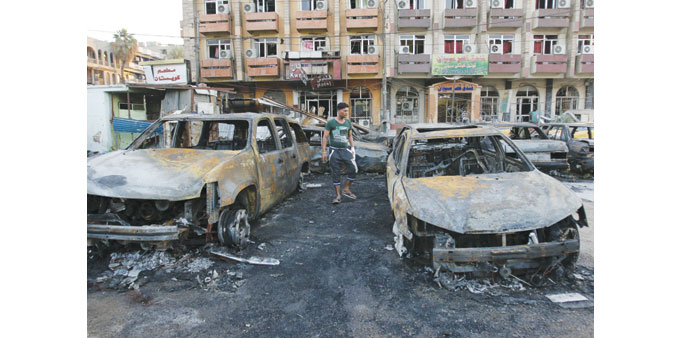A man looks at wreckage at the site of a car bomb attack in Baghdad. An IMF programme may help Iraq access international bond markets and cut the government’s borrowing costs at a time when Opec’s second-biggest oil producer is engulfed in a conflict with Islamic State militants.
Bloomberg
Baghdad
Iraq plans to borrow more from the International Monetary Fund, an economic adviser to Prime Minister Haidar al-Abadi said, as the nation’s economy buckles under the surging costs of fighting Islamic State militants and the plunge in global oil prices.
Iraqi officials will hold talks with the IMF during the fund’s annual meetings next month in Lima, Mudher Saleh said in a phone interview. He declined to say how much the government may borrow or what type of IMF program it will seek. The Washington-based lender has already extended a $1.25bn in emergency assistance to Iraq.
An IMF programme may help Iraq access international bond markets and cut the government’s borrowing costs at a time when Opec’s second-biggest oil producer is engulfed in a conflict with Islamic State militants. A 50% plunge in crude prices over the past year have compounded the crisis. The country will run a current-account deficit equal to 8% of economic output this year and a budget gap of 17%, according to IMF estimates.
Saleh said the government’s economic plans may go a long way in satisfying measures that would be required under an IMF loan accord. Finance Minister Hoshyar Zebari couldn’t be immediately reached for comment. “Some IMF programmes adopt Prime Minister Haidar Al-Abadi’s reforms and consider them enough,” Saleh said. Government reform efforts are “in harmony with what the IMF typically seeks,” he said.
Abadi announced a plan to tackle graft, sectarianism and political patronage in August after public protests and an endorsement from the country’s most senior Shia cleric, Grand Ayatollah Ali al-Sistani. The government is also cutting spending and this year’s budget deficit will likely be lower than the 25.4tn dinars ($20.9bn) originally planned, central bank Governor Ali Mohsen Ismail said in an interview this month.
Raza Agha, chief Middle East economist at VTB Capital, said in a note on September 27 that Iraq’s fiscal financing needs may exceed 20% of gross domestic product this year.
“We expect fiscal and external financing needs to remain high next year and for Iraq to be unable to meet them via heavy reliance on private creditors,” he said. “That would necessitate a much larger IMF programme” and more spending cuts, he said.

